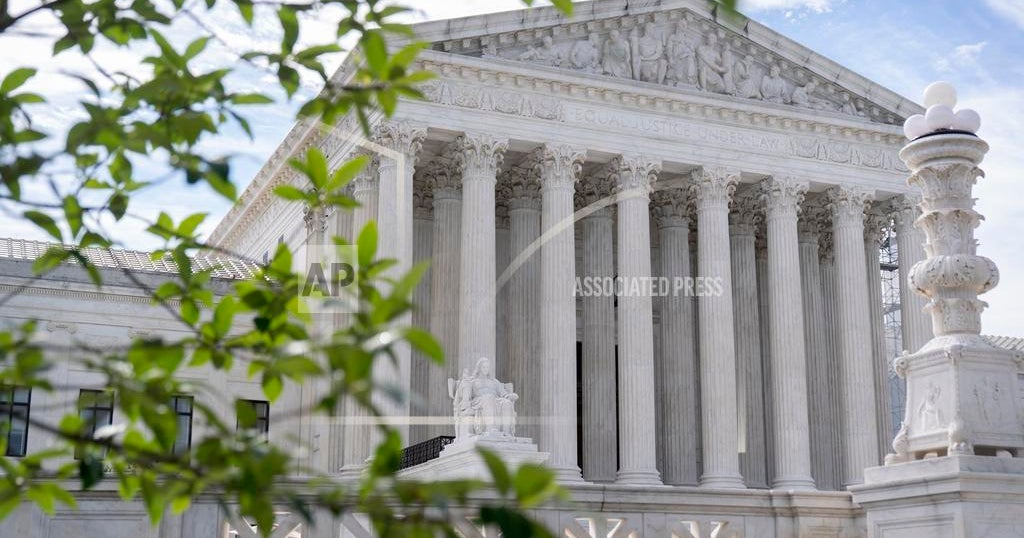Efforts to purge voter rolls ahead of 2024
Washington — Virginia officials on Monday asked the Supreme Court to allow the state to move forward with its removal of roughly 1,600 alleged noncitizens from its voter rolls, seeking its intervention just days before the November general election.
State election officials requested the high court pause a lower court order that blocked Virginia from continuing its systematic voter removal program that was launched in August, exactly 90 days before Election Day. A provision of the National Voter Registration Act requires states to complete programs aimed at purging ineligible voters from registration lists up to 90 days before federal elections.
Virginia officials asked the Supreme Court to grant its request for emergency relief by Tuesday. They claimed that the district court’s order violates Virginia law “and common sense” and “mandates a variety of disruptive measures.”
The injunction issued by the lower court will harm “Virginia’s sovereignty, confuse her voters, overload her election machinery and administrators, and likely lead noncitizens to think they are permitted to vote, a criminal offense that will cancel the franchise of eligible voters,” state officials wrote.
Federal law prohibits noncitizens from voting in federal elections.
Virginia’s bid for the Supreme Court’s intervention arose from a Justice Department lawsuit filed against the state earlier this month that targeted an executive order from Gov. Glenn Youngkin, a Republican. The order formalized a systematic program to remove from statewide voter registration lists people who were unable to verify that they are citizens to the Department of Motor Vehicles. State officials say the program was in place, and the order merely changed the frequency of the data reporting from monthly to daily.
The Justice Department argued that the implementation of the program violates the so-called Quiet Period Provision, a section of the National Voter Registration Act that bars states from implementing programs that seek to remove ineligible voters from their rolls by no later than 90 days before an election. Youngkin announced his state’s systematic program on Aug. 7, exactly 90 days before the Nov. 5 general election.
U.S. District Judge Patricia Giles granted the Justice Department’s request for a preliminary injunction Friday, ordering the state to restore the registrations of roughly 1,600 people who were purged from state rolls under Youngkin’s program. Giles found the state likely violated federal law when it systematically canceled those voters’ registrations during the so-called quiet period.
A panel of three judges on the U.S. Court of Appeals for the 4th Circuit upheld the district court’s order Sunday, saying in a brief order that it is “unpersuaded” by the argument from Virginia officials that the state’s program doesn’t violate the federal voter registration law.
The three-judge panel found state officials were wrong to assert that they were ordered to restore roughly 1,600 noncitizens to voter rolls, as they did not know that those removed under Youngkin’s program were actually noncitizens. It reiterated that some of the people whose voter registrations were canceled are eligible to cast ballots.
In their request to the Supreme Court, Virginia officials argued the Quiet Period Provision doesn’t apply to the removal of noncitizens from the state’s voter rolls, since they’re not eligible to vote at all. Still, they said that those who were identified as noncitizens and registered voters are informed that their registrations will be canceled and given 14 days to verify that they are citizens.
State officials argued in their filing that the Justice Department and voting rights groups asked the district court to “inject itself into the Commonwealth’s reasonable and longstanding election processes within a month of the election, and weeks after early voting had begun.”
They also refuted the characterization of its efforts to purge alleged noncitizens from its rolls, noting that Youngkin’s order did not create that process, but rather increased the frequency of data-sharing among agencies from monthly to daily.
The Justice Department and voting groups have until Tuesday afternoon to respond to the state’s request for relief.
- In:
- Virginia
Melissa Quinn is a politics reporter for CBSNews.com. She has written for outlets including the Washington Examiner, Daily Signal and Alexandria Times. Melissa covers U.S. politics, with a focus on the Supreme Court and federal courts.


